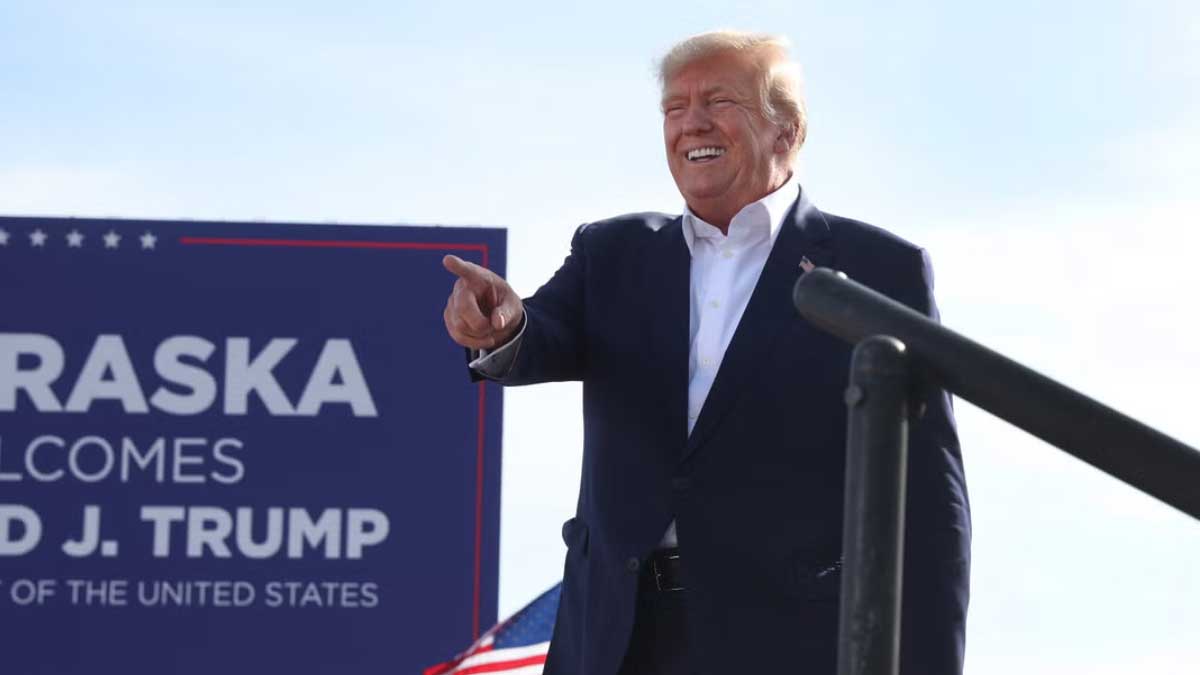- Home
- Billionaires
- Investing Newsletters
- 193CC 1000
- Article Layout 2
- Article Layout 3
- Article Layout 4
- Article Layout 5
- Article Layout 6
- Article Layout 7
- Article Layout 8
- Article Layout 9
- Article Layout 10
- Article Layout 11
- Article Layout 12
- Article Layout 13
- Article Layout 14
- Article Sidebar
- Post Format
- pages
- Archive Layouts
- Post Gallery
- Post Video Background
- Post Review
- Sponsored Post
- Leadership
- Business
- Money
- Small Business
- Innovation
- Shop
Recent Posts
Trump Slams Nebraska Senator Over Electoral Vote Block

Former President Donald Trump launched a scathing attack on Nebraska Republican State Senator Mike McDonnell for refusing to back a proposed change to Nebraska’s Electoral College voting system that could have boosted Trump’s chances of winning the state’s votes in the upcoming presidential election. Trump’s criticism, delivered via his Truth Social platform, was a direct response to McDonnell’s decision to maintain Nebraska’s current method of allocating electoral votes, which differs from the winner-takes-all approach used by the vast majority of other states.
In his post, Trump branded McDonnell a “Grandstander!” and accused him of obstructing a Republican victory “for no reason whatsoever.” The former president’s outburst came shortly after McDonnell reiterated his opposition to the proposed changes, citing concerns about both the timing and the potential ramifications of such a move. McDonnell expressed unease about Nebraska’s diminished role on the national stage if the change were implemented so close to Election Day.
Nebraska’s electoral vote allocation system is unique, shared only with Maine. Instead of awarding all its Electoral College votes to the overall winner of the state’s popular vote, Nebraska splits its five votes: two go to the statewide winner, while the other three are distributed based on the winner in each of the state’s three congressional districts. This system has allowed for Nebraska’s votes to be split between two candidates, as occurred in the 2020 election when President Joe Biden won the electoral vote from Nebraska’s 2nd Congressional District, which covers Omaha, while Trump claimed the other four.
Republicans in Nebraska had been pushing to revert to a winner-takes-all model, believing this would guarantee all five of Nebraska’s electoral votes for Trump in the upcoming election. Their efforts were aimed at increasing Trump’s chances in the Electoral College by ensuring he would capture the vote from the Omaha district, a traditionally more competitive area, which is currently leaning toward Vice President Kamala Harris, the presumptive Democratic nominee.
McDonnell, a Democrat-turned-Republican, issued a statement explaining his reasoning for opposing the change, stating that the timing—just 43 days before the election—was inappropriate for such a major adjustment. He emphasized that altering Nebraska’s electoral vote system at this stage could reduce the state’s significance on the national stage, as it would eliminate the competitive nature of the Omaha district, a factor that draws attention to Nebraska during presidential campaigns.
“After deep consideration, it is clear to me that right now, 43 days from Election Day, is not the moment to make this change,” McDonnell said in his statement, which was reported by the Omaha World-Herald. The state senator’s decision to hold firm against the change has drawn sharp criticism from members of his own party, who argue that Nebraska should join the majority of states in adopting the winner-takes-all model.
The debate over Nebraska’s electoral vote allocation has broader implications for the 2024 presidential race, which is shaping up to be extremely competitive. Republicans believed that a shift to a winner-takes-all system could have secured Trump the electoral vote from the Omaha district, thus bolstering his chances in the broader Electoral College. The state’s unique system had allowed Biden to win a single electoral vote from Nebraska in 2020, and Republicans feared a repeat scenario in which Harris could claim that Omaha-based vote in the 2024 election.
Had McDonnell supported the switch to a winner-takes-all model, Trump’s path to winning all of Nebraska’s electoral votes would have been far easier. The current allocation system presents a scenario where Harris could win the Omaha district’s electoral vote, leaving Trump with just four of Nebraska’s five votes. In a close election, such as the one anticipated in 2024, this single electoral vote could prove critical.
If Trump were to win Nebraska’s electoral vote from the Omaha district, combined with victories in key swing states across the Sun Belt, and Harris were to maintain her hold on the so-called “blue wall” states of Michigan, Pennsylvania, and Wisconsin, the two candidates could end up tied in the Electoral College with 269 votes each. In such a situation, the decision would be sent to the GOP-controlled House of Representatives, where Republicans would likely select Trump as president.
The push to change Nebraska’s electoral vote allocation comes as the race between Trump and Harris is expected to be extremely tight. As of Monday, Harris led Trump by just 2.8 points in polling averages, according to FiveThirtyEight. Both campaigns are intensely focused on a handful of swing states, including Arizona, Georgia, Michigan, Nevada, North Carolina, Pennsylvania, and Wisconsin, which could determine the outcome of the election.
McDonnell’s opposition to the proposed change has not deterred other prominent Republicans in Nebraska from pushing for it. Trump took to Truth Social to express gratitude toward Nebraska Governor Jim Pillen, who supported the change, and Omaha Mayor Jean Stothert, a Republican, who has also voiced her backing for the winner-takes-all approach. Trump praised their efforts to pass the change, stating it “would have been better, and far less expensive, for everyone!”
The battle over Nebraska’s electoral vote system underscores the high stakes of the 2024 election, where even small shifts in voting systems or electoral votes could have outsized consequences. As the election approaches, both parties will continue to maneuver for any potential advantage, and debates like the one in Nebraska serve as reminders of how crucial the Electoral College remains in determining the outcome of presidential races. Despite Trump’s public pressure on McDonnell, the state senator’s decision to stand firm against the proposed change highlights the complexity of balancing political calculations with concerns over the timing and impact of electoral reforms.
Recent Posts
Categories
- 193cc Digital Assets2
- 5G1
- Aerospace & Defense46
- AI37
- Arts3
- Banking & Insurance11
- Big Data3
- Billionaires449
- Boats & Planes1
- Business328
- Careers13
- Cars & Bikes76
- CEO Network1
- CFO Network17
- CHRO Network1
- CIO Network1
- Cloud10
- CMO Network18
- Commercial Real Estate7
- Consultant1
- Consumer Tech180
- CxO1
- Cybersecurity68
- Dining1
- Diversity, Equity & Inclusion4
- Education7
- Energy8
- Enterprise Tech29
- Events11
- Fintech1
- Food & Drink2
- Franchises1
- Freelance1
- Future Of Work2
- Games141
- GIG1
- Healthcare78
- Hollywood & Entertainment186
- Houses1
- Innovation42
- Investing2
- Investing Newsletters4
- Leadership65
- Lifestyle11
- Manufacturing1
- Markets20
- Media193
- Mobile phone1
- Money13
- Personal Finance2
- Policy567
- Real Estate1
- Research6
- Retail1
- Retirement1
- Small Business1
- SportsMoney33
- Style & Beauty1
- Success Income1
- Taxes2
- Travel10
- Uncategorized8
- Vices1
- Watches & Jewelry2
- world's billionaires418
Related Articles
Trump Moves $4B Stake in Truth Social Parent, Stock Drops 6%
Donald Trump recently transferred his 57% stake in Trump Media & Technology...
By 193cc Agency CouncilDecember 20, 2024House Rejects Trump-Backed Funding Bill, Shutdown Looms
The U.S. House of Representatives rejected a new government funding bill on...
By 193cc Agency CouncilDecember 20, 2024Trump Named Time’s Person of the Year for Second Time
On Thursday, Time magazine honored Donald Trump as its “Person of the...
By 193cc Agency CouncilDecember 12, 2024Meta Donates $1 Million to Trump’s Inaugural Fund
Meta, the parent company of Facebook and Instagram, has confirmed a $1...
By 193cc Agency CouncilDecember 12, 2024















Leave a comment